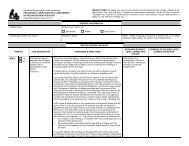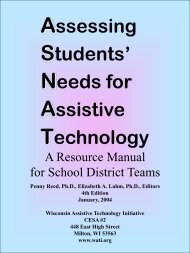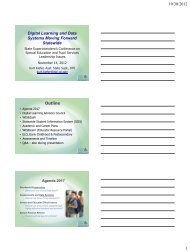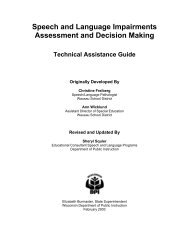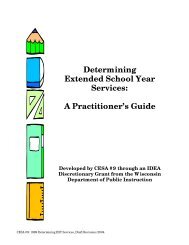Wisconsin Department of Public Instruction: An Introduction to ...
Wisconsin Department of Public Instruction: An Introduction to ...
Wisconsin Department of Public Instruction: An Introduction to ...
Create successful ePaper yourself
Turn your PDF publications into a flip-book with our unique Google optimized e-Paper software.
<strong>An</strong> <strong>Introduction</strong> <strong>to</strong><br />
Special Education<br />
<strong>Wisconsin</strong> <strong>Department</strong> <strong>of</strong> public instruction<br />
elizabeth burmaster, state superintenDent
<strong>An</strong> <strong>Introduction</strong> <strong>to</strong><br />
Special Education<br />
Welcome <strong>to</strong> special education. You will<br />
hear many new words. Ask if you don’t<br />
know what they mean. Here are some you<br />
will hear.<br />
DPI: <strong>Department</strong> <strong>of</strong> <strong>Public</strong> <strong>Instruction</strong>.<br />
DPI is in charge <strong>of</strong> all public schools.<br />
FAPE: Free Appropriate <strong>Public</strong> Education<br />
IEP: Individualized Education Program.<br />
The IEP is a written plan. It tells what<br />
a child will learn in a year. It tells the<br />
services the school will give.<br />
IDEA: Individuals with Disabilities<br />
Education Act. It is the federal special<br />
education law.<br />
LEA: Local educational agency. Your LEA<br />
is usually your school district.<br />
(See page 9 for more special education<br />
words.)<br />
A division in the DPI takes care <strong>of</strong><br />
special education. This division is<br />
called the Division for Learning<br />
Support: Equity and Advocacy or<br />
DLSEA.<br />
You can call DPI’s information<br />
number if you need <strong>to</strong> contact DPI:<br />
(800) 441-4563<br />
TDD: (608) 267-2427<br />
DPI has a website at http://dpi.<br />
wi.gov. The DPI website has much<br />
useful information.<br />
There are other<br />
agencies <strong>to</strong> help<br />
parents:<br />
WI-FACETS<br />
2714 North Dr. Martin<br />
Luther King Drive<br />
Milwaukee, WI 53212<br />
(414) 374-4645<br />
TDD: (414) 374-4635<br />
(877) 374-4677<br />
Disability Rights <strong>Wisconsin</strong><br />
131 West Wilson Street<br />
Suite 700<br />
Madison, WI 53703<br />
(608) 267-0214<br />
(800) 928-8778 (WI only)<br />
<strong>Wisconsin</strong> Statewide<br />
Parent-Educa<strong>to</strong>r Initiative<br />
Building D-2, Mailbox 65<br />
800 <strong>Wisconsin</strong> Street<br />
Eau Claire, WI 54703<br />
(877) 844-4925<br />
Thank you <strong>to</strong> the students<br />
(and their teacher,<br />
Patricia Werner) at the<br />
<strong>Wisconsin</strong> School for the<br />
Deaf for the artwork on<br />
the front and back covers.
If your child has a disability, special education can help your<br />
child learn.<br />
You will work as part <strong>of</strong> a team along with others from the<br />
school. The team will decide if your child qualifies for special<br />
education. If your child qualifies, the team will make a written<br />
plan for your child. The plan is called an Individualized<br />
Education Program or IEP. The team is called the IEP team.<br />
The IEP is developed by the IEP team at a meeting. <strong>An</strong> IEP is<br />
good for one year. It can be changed during the year. It may<br />
be changed during the year without a meeting if you agree.<br />
The IEP team has a very important job. You will want <strong>to</strong> go<br />
<strong>to</strong> all IEP team meetings. You will want <strong>to</strong> be part <strong>of</strong> all the<br />
decisions about your child.<br />
You know your child best. The IEP team needs you!<br />
Who participates on the IEP Team?<br />
• Parents. Parents are equal partners with the school staff on the IEP team.<br />
• The child. When the team plans for life after high school and at other<br />
times, if appropriate.<br />
• <strong>An</strong> LEA (school district) representative. A person from the school district<br />
who can make sure your child gets the IEP services.<br />
• The child’s regular education teacher.<br />
• The child’s special education teacher.<br />
• Someone who can explain the tests your child <strong>to</strong>ok.<br />
• For an older child, someone from each agency that will provide services <strong>to</strong><br />
prepare the child for life after high school.<br />
• Other people invited by you or by the school.<br />
Sometimes one person does more than one job on the team. A person may be<br />
excused from all or part <strong>of</strong> the meeting if you agree in writing.
Referral<br />
<strong>An</strong>yone can ask the school <strong>to</strong> decide if a child needs special<br />
education. You, a teacher, a nurse or a doc<strong>to</strong>r can ask. This is called a<br />
referral. A referral must be written. You can send a referral letter<br />
<strong>to</strong> the principal or special education direc<strong>to</strong>r.<br />
A referral letter should:<br />
• Tell the date.<br />
• Say “This is a referral for special education.”<br />
• Tell the child’s first and last name, date <strong>of</strong> birth, and school.<br />
• Tell why you think the child might need special education.<br />
Your school has up <strong>to</strong> 15 business days from when they get a referral <strong>to</strong> decide if<br />
more tests are needed. Your school will ask for your permission if more tests are<br />
needed. Your school has up <strong>to</strong> 60 days from when they get your permission <strong>to</strong><br />
test your child and decide if your child qualifies. They have up <strong>to</strong> 30 days after<br />
your child qualifies <strong>to</strong>:<br />
• Write an IEP.<br />
• Decide where your child will go <strong>to</strong> school and tell you in writing.<br />
The school will send you paperwork. Start a file.<br />
You need <strong>to</strong> understand the papers so you can help the others on the IEP team. If<br />
you don’t understand something, call the school. They will explain it. They also<br />
will tell you where you can get more help understanding it.<br />
Steps in the IEP Team Process:<br />
1. Referring your child for special education.<br />
2. Evaluating your child.<br />
• Does your child have an impairment?<br />
• Does your child need special education?<br />
3. Deciding what services are needed and writing the IEP. The<br />
school must have a meeting <strong>to</strong> write the IEP within 30 days<br />
<strong>of</strong> deciding your child is eligible for special education.<br />
4. Deciding where your child will receive services and<br />
sending you a placement notice.<br />
5. Reviewing the IEP and placement at least once each year.<br />
6. Reevaluating your child at least once every three years. You<br />
and the school can agree not <strong>to</strong> reevaluate your child.
State and federal laws say<br />
parents must get notices at<br />
several important steps in the<br />
process.<br />
You will get a written notice:<br />
• before the IEP team evaluates<br />
your child (even if no<br />
new testing is needed).<br />
• before the school puts your<br />
child in special education.<br />
• before the school changes<br />
your child’s IEP or placement.<br />
• if the school refuses your<br />
request <strong>to</strong> change your<br />
child’s evaluation, IEP, services,<br />
or placement.<br />
As a parent you will also get<br />
a list <strong>of</strong> special education<br />
rights:<br />
• once a year; and<br />
• when the school gets the<br />
first special education<br />
referral for your child;<br />
• when you request an IEP<br />
team evaluate your child;<br />
• the first time in a school<br />
year you request a due<br />
process hearing;<br />
• the first time in a school<br />
year you send a complaint<br />
<strong>to</strong> DPI;<br />
• when the school decides <strong>to</strong><br />
change your child’s placement<br />
for breaking school<br />
rules;<br />
• when you ask for the list <strong>of</strong><br />
rights.<br />
Permission<br />
Your permission is important. The school<br />
must get your permission at key times. You<br />
must give your written permission:<br />
• before the IEP team gives your child<br />
special tests.<br />
• before the school first gives your<br />
child special education.<br />
Make sure you know what you are signing.<br />
If you don’t understand all the paperwork,<br />
ask the school <strong>to</strong> explain. It’s important that<br />
you understand. That way you can help the<br />
IEP team make good decisions.<br />
Evaluations<br />
<strong>An</strong> IEP team evaluates your child. The<br />
IEP team starts by looking at information<br />
it already has. You will share information<br />
about your child. You and the rest <strong>of</strong> the<br />
team will decide if the team needs more<br />
information. This can happen at a meeting<br />
or through a telephone call. Sometimes<br />
more information is needed. Then the team<br />
decides how <strong>to</strong> get more information. The<br />
teachers might test your child. They might<br />
watch your child in class. They will get a<br />
complete picture <strong>of</strong> your child.<br />
Before the teachers test your child, you<br />
will be <strong>to</strong>ld in writing about the tests. The<br />
school will ask your permission <strong>to</strong> give the<br />
tests. When the testing is finished, you will<br />
be invited <strong>to</strong> an IEP team meeting.
The IEP Team Meeting<br />
You are an equal partner on the IEP team along with the teachers. You are an<br />
expert about your child. Speak up! The rest <strong>of</strong> the team needs your ideas.<br />
At the meeting, the team will talk about all the information. This includes what<br />
you have <strong>to</strong>ld the team. The team will decide if your child has one <strong>of</strong> the impairments<br />
in state rules. The team will decide if your child needs special education.<br />
Then the team will write an evaluation report. You will get a copy <strong>of</strong> the report.<br />
If your child is not eligible for special education, the school will tell you in writing.<br />
If your child will get special education, the team writes an IEP. When the IEP is<br />
finished, the team decides where your child will go <strong>to</strong> school. The team decides<br />
based on the IEP.<br />
Sometimes the IEP team can do all <strong>of</strong> its work in one meeting. Sometimes it<br />
takes more than one meeting. You may want <strong>to</strong> take a break before planning your<br />
child’s program. You may need time <strong>to</strong> read the reports. You may need time <strong>to</strong><br />
talk <strong>to</strong> others about what the team decided. Ask the IEP team <strong>to</strong> wait if you need<br />
some time. The school will hold another meeting <strong>to</strong> finish if they can do it within<br />
the time lines.<br />
Ideas for IEP team meeting:<br />
Talk with your child’s teachers<br />
before the meeting.<br />
Bring a list <strong>of</strong> your questions<br />
or concerns. You can use the<br />
worksheets in this booklet.<br />
Some parents find it stressful<br />
<strong>to</strong> go <strong>to</strong> an IEP team meeting.<br />
Bringing someone with you<br />
may help.<br />
You can bring an expert or<br />
someone who knows your<br />
child <strong>to</strong> the IEP meeting.<br />
If you need notes <strong>to</strong> remember<br />
what was said at the meeting,<br />
take notes or ask someone <strong>to</strong><br />
do it for you.<br />
If you need time <strong>to</strong> think or talk <strong>to</strong> someone<br />
else, tell the rest <strong>of</strong> the IEP team that you want<br />
<strong>to</strong> set up another meeting.<br />
The following impairments are listed<br />
in state rules:<br />
• Autism<br />
• Cognitive Disability (CD)<br />
• Emotional Behavioral Disability (EBD)<br />
• Hearing Impairment (HI)<br />
• Specific Learning Disability (SLD)<br />
• Orthopedic Impairment (OI)<br />
• Other Health Impairment (OHI)<br />
• Significant Developmental Delay (SDD)<br />
• Speech or Language Impairment (S/L)<br />
• Traumatic Brain Injury (TBI)<br />
• Visual Impairment (VI)
What is in the IEP?<br />
The IEP includes—<br />
• your child’s present level<br />
<strong>of</strong> performance.<br />
• annual goals.<br />
• special education and<br />
related services.<br />
• the starting date, amount,<br />
frequency, location, and<br />
duration <strong>of</strong> IEP services.<br />
• services your child needs<br />
<strong>to</strong> succeed in regular<br />
education.<br />
• supports that teachers need<br />
<strong>to</strong> teach your child.<br />
• the extent your child<br />
will not be in regular classes<br />
and not learn the general<br />
education curriculum.<br />
• for children 14 and older,<br />
planning for life after high<br />
school.<br />
• how the school will<br />
measure progress on the<br />
IEP goals.<br />
• when the school will<br />
tell you about your child’s<br />
progress on the IEP goals.<br />
Writing the IEP<br />
The IEP is a plan. It tells about your child’s<br />
school needs. It tells what your child’s<br />
learning goals are for the year. It tells what<br />
services the school will give your child.<br />
As much as possible, your child will be in<br />
the regular classroom. As much as possible,<br />
your child will learn what children without<br />
disabilities learn.<br />
At least once a year the IEP team must meet<br />
<strong>to</strong> talk about the IEP. You can ask the IEP<br />
team <strong>to</strong> meet and make changes if you think<br />
they are needed. Call your principal or your<br />
child’s teacher or write a letter.<br />
Where Will Your Child<br />
Go <strong>to</strong> School?<br />
When the team finishes the IEP, the team<br />
will decide where your child will go <strong>to</strong><br />
school. The team will decide based on the<br />
IEP.<br />
As much as possible, a child with a disability<br />
should go <strong>to</strong> the same school with<br />
children without disabilities. Sometimes this<br />
is not possible. Sometimes the child’s IEP<br />
can’t be carried out in the same school. Then<br />
the child should go <strong>to</strong> a school as close as<br />
possible <strong>to</strong> home.<br />
At least once a year the IEP team meets <strong>to</strong><br />
decide where your child should go <strong>to</strong> school.
After the IEP<br />
Team Meeting<br />
The school may ask you <strong>to</strong> sign the IEP.<br />
Signing it does not mean you agree with<br />
everything. Signing it means you were at<br />
the meeting. So even if you don’t agree with<br />
everything, you can sign it.<br />
You can ask for a copy <strong>of</strong> the IEP. If you do<br />
not ask for it, you will get a copy when the<br />
school tells you in writing where your child<br />
will go <strong>to</strong> school.<br />
You should be able <strong>to</strong> understand the IEP.<br />
You can give a copy <strong>to</strong> anyone.<br />
All <strong>of</strong> your child’s teachers can read the<br />
IEP. The teachers must follow the IEP. The<br />
school must tell each teacher how <strong>to</strong> follow<br />
the IEP.<br />
If this is the first time your child will get<br />
special education, the school will ask for<br />
your written permission. After you give it,<br />
the school will start your child’s special<br />
education.<br />
Several times during the year, the school<br />
will tell you if your child is making progress<br />
<strong>to</strong> reach the IEP goals. The team should<br />
review the IEP if your child is not making<br />
progress. If you think the IEP needs <strong>to</strong> be<br />
changed, call your principal or your child’s<br />
teacher.<br />
What about your<br />
child’s ideas?<br />
You can ask your child what<br />
he or she needs.<br />
You can tell the IEP team<br />
what you think your child<br />
needs.<br />
Many children can be a part<br />
<strong>of</strong> their own IEP team! You<br />
can bring your child <strong>to</strong> the<br />
IEP meeting.<br />
If possible you should<br />
talk <strong>to</strong> the school before<br />
bringing your child <strong>to</strong> the<br />
IEP team meeting.<br />
Older children (by age 14)<br />
must be invited <strong>to</strong> IEP team<br />
meetings that plan for life<br />
after high school.<br />
If your child can understand<br />
the IEP, you can share it with<br />
him or her.
Sometimes problems can’t<br />
be solved without an outside<br />
person’s help. To find out more,<br />
or <strong>to</strong> ask for mediation, call—<br />
The <strong>Wisconsin</strong> Special<br />
Education Mediation<br />
System at:<br />
(888) 298-3857 (Toll-Free<br />
Voice)<br />
(414) 288-1425<br />
TTY: (414) 288-6129<br />
FAX: (414) 288-7537<br />
Website:<br />
www.cesa7.k12.wi.us/sped/<br />
wsems/index.htm<br />
Solving Problems<br />
If you have a problem, try talking <strong>to</strong><br />
people at school. Sometimes you may not<br />
agree with the decisions <strong>of</strong> the IEP team.<br />
Try these!<br />
• Ask someone for advice.<br />
• Write a letter <strong>to</strong> the school.<br />
• Ask for another IEP team meeting.<br />
• Talk it out.<br />
• Say, “Can you help me understand...?”<br />
• Make suggestions: “Would you be<br />
willing <strong>to</strong> try....?”<br />
You can also ask for mediation. There<br />
are trained people (media<strong>to</strong>rs) <strong>to</strong> help.<br />
A media<strong>to</strong>r can help you and the school<br />
solve the problem. Both you and the<br />
school must agree <strong>to</strong> do it. It is free. The<br />
meetings are private. <strong>An</strong>y agreement<br />
will be in writing. The law says that you<br />
and the school must follow the agreement.<br />
IEP team meetings or mediation can solve<br />
most problems. If you need help, you can<br />
talk <strong>to</strong> a parent group or a program <strong>to</strong><br />
help parents. In a rare case, these might<br />
not work. You can ask for a due process<br />
hearing. This is a formal hearing before a<br />
judge. The judge will decide the question.<br />
If you think the school did not follow<br />
special education laws, you can file a<br />
complaint with DPI. You can call DPI<br />
for more information about hearings and<br />
complaints.
Do you want <strong>to</strong> learn more about special<br />
education?<br />
Do you want <strong>to</strong> know more about IEPs?<br />
You can get a book called<br />
Special Education in Plain Language.<br />
It is available from:<br />
• your school district’s special education <strong>of</strong>fice.<br />
(please note: availability may be limited.)<br />
• the DPI website, http://www.dpi.wi.gov/sped/<br />
par_mtls.html<br />
More special education<br />
words you will use:<br />
business day: Monday through Friday,<br />
except state and federal holidays.<br />
evaluation: A team decides if your child<br />
needs special education. You are part <strong>of</strong> the<br />
team. The team will decide the kind and<br />
amount <strong>of</strong> services.<br />
mediation: <strong>An</strong> outside person helps<br />
parents and the school solve problems.<br />
placement: The placement is the IEP, the<br />
type <strong>of</strong> special program (e.g., resource<br />
room, self-contained class), and the child’s<br />
school.<br />
reevaluation: <strong>An</strong>y evaluation after your<br />
child qualifies for special education.<br />
referral: When someone thinks a child<br />
might need special education and tells the<br />
school in writing.<br />
related services: Services your child needs<br />
<strong>to</strong> benefit from special education.<br />
special education: The special teaching<br />
your child gets <strong>to</strong> meet his or her needs as<br />
a child with a disability.<br />
Other good websites for<br />
parents:<br />
http://www.dpi.wi.gov/sped/<br />
parent.html<br />
http://www.wifacets.org<br />
http:// www. familyvillage.<br />
wisc.edu<br />
http://www.disabilityinfo.gov<br />
Topics in Special<br />
Education in Plain<br />
Language include:<br />
• Parents’ Rights<br />
• Getting School<br />
Records<br />
• Private Schools<br />
• Problem Solving<br />
• Discipline and<br />
Behavior Issues<br />
• The IEP Process<br />
• Timelines<br />
• Parent Consent<br />
• What Schools Do<br />
• What Parents Need<br />
<strong>to</strong> Know<br />
• Tips and Ideas<br />
• List <strong>of</strong> Resources and<br />
Organizations<br />
• and MORE!
A Worksheet for Parents<br />
Child’s Name:___________________________ Date <strong>of</strong> Birth:______________<br />
School Year:___________ School:____________________________________<br />
My child’s principal and phone number:<br />
0<br />
_____________________________________________________________<br />
My child’s special education teachers and their phone numbers:<br />
_____________________________________________________________<br />
_____________________________________________________________<br />
_____________________________________________________________<br />
_____________________________________________________________<br />
_____________________________________________________________<br />
My child’s general education teachers and their phone numbers:<br />
_____________________________________________________________<br />
_____________________________________________________________<br />
_____________________________________________________________<br />
_____________________________________________________________<br />
_____________________________________________________________<br />
Other important numbers:<br />
_____________________________________________________________<br />
_____________________________________________________________<br />
_____________________________________________________________<br />
_____________________________________________________________<br />
_____________________________________________________________<br />
_____________________________________________________________
Members <strong>of</strong> my child’s IEP team and their phone numbers:<br />
_____________________________________________________________<br />
_____________________________________________________________<br />
_____________________________________________________________<br />
_____________________________________________________________<br />
_____________________________________________________________<br />
Dates for this year’s IEP team meeting:<br />
_____________________________________________________________<br />
_____________________________________________________________<br />
_____________________________________________________________<br />
_____________________________________________________________<br />
What are my child’s strengths at home and at school?<br />
_____________________________________________________________<br />
_____________________________________________________________<br />
_____________________________________________________________<br />
_____________________________________________________________<br />
_____________________________________________________________<br />
_____________________________________________________________<br />
_____________________________________________________________<br />
What are my child’s needs?<br />
_____________________________________________________________<br />
_____________________________________________________________<br />
_____________________________________________________________<br />
_____________________________________________________________<br />
_____________________________________________________________<br />
_____________________________________________________________
A Worksheet for Parents (continued from other side)<br />
What supports are needed for my child <strong>to</strong> be successful at school?<br />
_________________________________________________________<br />
_________________________________________________________<br />
_________________________________________________________<br />
_________________________________________________________<br />
_________________________________________________________<br />
_________________________________________________________<br />
_________________________________________________________<br />
What are my dreams for my child?<br />
_________________________________________________________<br />
_________________________________________________________<br />
_________________________________________________________<br />
_________________________________________________________<br />
_________________________________________________________<br />
_________________________________________________________<br />
_________________________________________________________<br />
What are my concerns about my child’s education?<br />
_________________________________________________________<br />
_________________________________________________________<br />
_________________________________________________________<br />
_________________________________________________________<br />
_________________________________________________________<br />
_________________________________________________________<br />
_________________________________________________________<br />
_________________________________________________________
For more information contact:<br />
Special Education Team<br />
<strong>Wisconsin</strong> <strong>Department</strong> <strong>of</strong> <strong>Public</strong> <strong>Instruction</strong><br />
P.O. Box 7841<br />
Madison, WI 53707-7841<br />
608-267-9164<br />
dpispeddata@dpi.state.wi.us<br />
http://www.dpi.wi.gov/sped/par_mtls.html<br />
June 2007<br />
The <strong>Department</strong> <strong>of</strong> <strong>Public</strong> <strong>Instruction</strong> does not discriminate<br />
on the basis <strong>of</strong> sex, race, color, religion, creed age, national<br />
origin, ancestry, pregnancy, marital status or parental status,<br />
sexual orientation or disability.<br />
This was made possible by funding from IDEA grant number<br />
H027A060064A. Its content may be reprinted, in whole or<br />
in part, with credit <strong>to</strong> WI DPI acknowledged. However,<br />
reproduction in whole or in part for resale is not authorized.<br />
If this grant results in a book or other product not specifically<br />
required <strong>to</strong> fulfill this grant, the DPI reserves a royalty-free,<br />
nonexclusive, irrevocable license <strong>to</strong> reproduce, publish or<br />
otherwise use, and <strong>to</strong> authorize others <strong>to</strong> use, any portion<br />
<strong>of</strong> the product that was originally created <strong>to</strong> fulfill the grant<br />
requirements or using grant funds.<br />
Printed on recycled paper




